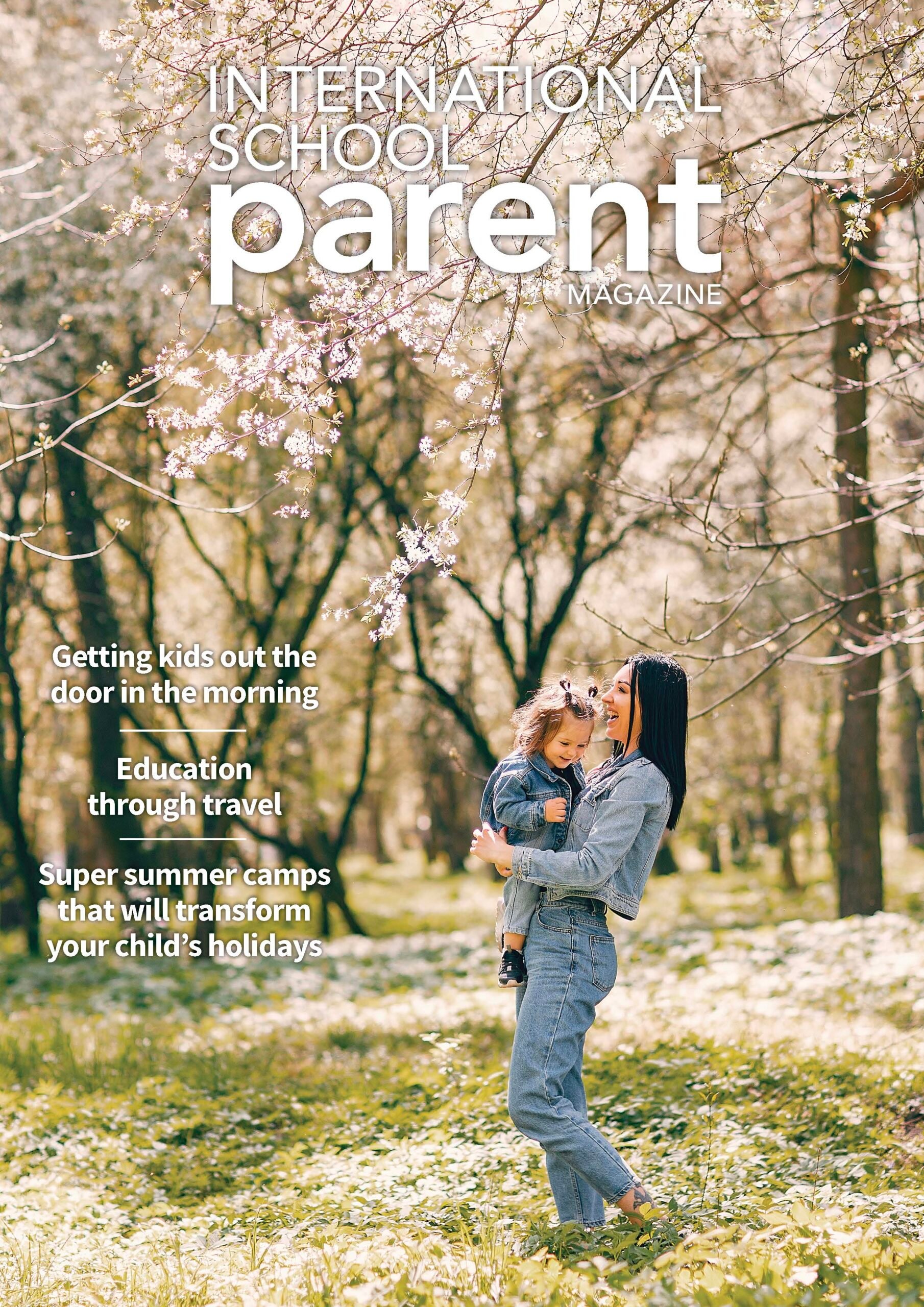Meet the Headteachers – Bryan Nixon – TASIS England

Bryan Nixon has been Head of School at The American School in England (TASIS England) since June 2017. Before that, he has led international schools in locations as varied as the Bahamas, Germany, and the United States over the course of his long career in education. TASIS England was founded in 1976 and is an independent, co-ed, international school near London for day pupils, ages 3-18, and boarding pupils ages 14-18 from more than 50 countries. TASIS England offers a broad-based American curriculum with a global perspective, an American high school diploma, 20 AP courses, and a full IB Diploma Programme; as well as a wide range of extracurricular activities.
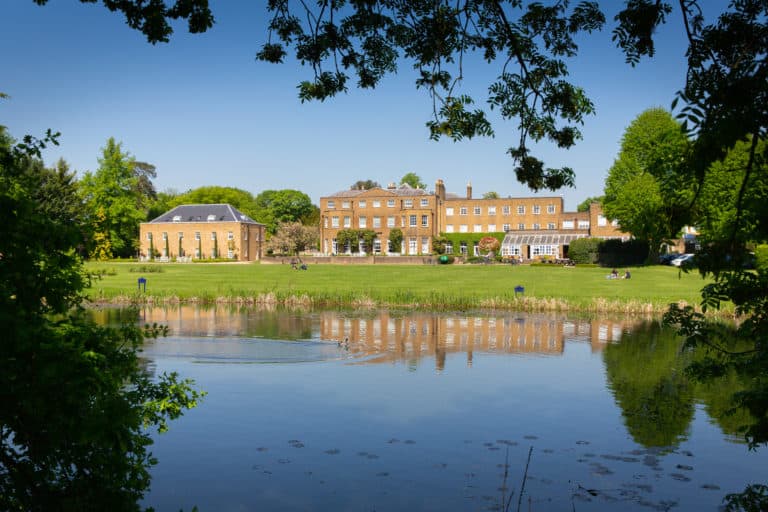
Tell us about your background and what initially inspired you to pursue a career in education.
Early on, I wasn’t actually thinking about a career in education. I was born and raised close to Belfast and grew up there during the troubles. I had a great childhood but also growing up in Northern Ireland at the time, you were acutely aware of “the other”. This is important, as you will see.
At 16, I had a history teacher who really challenged me to think differently. We were studying Irish history in the 1600s and the early 1700s, which includes a pivotal moment in Irish history, the Battle of the Boyne in 1690. For those not aware, the Battle of the Boyne was a significant event that contributed to the divide between Catholics and Protestants in Northern Ireland. Our teacher challenged us, as young Protestant males, to understand that everything we thought and believed might not be entirely true. I remember hating him for it. I remember looking at the man and thinking, “Wow, he’s got this so wrong.”
Interestingly, he got me excited about reading about the period, my culture and my history. He showed me what a great teacher can do, in terms of opening your mind and opening pathways to learning. He was indeed the one that inspired me to think, “You know what, I can do this. I can support others in opening their minds, and thinking about pathways, lifelong learning, and international mindedness.” It was really quite a moment. He was a pivotal person that changed my life.
Starting Teaching
In 1994, I became a teacher and started working in a primary school close to Belfast that I had attended as a student. In 1997, things changed for me when I met my future wife, who was a Bahamian citizen. We had to make the choice of either living in Belfast or the Bahamas. The Bahamas won, so I then worked in the Bahamas in St Andrews School for six years. Then I moved to Munich, Germany and worked in the Bavarian International School for nine years, serving the last four years as the Head of School. Next, we went to Whitby School in Greenwich, Connecticut, where I was the Head of School for five years. Now I’m back in Europe since June 2017, working as Head of School for TASIS England, The American School in England.
Amongst all that, for the past 18 years, I’ve been working for the International Baccalaureate as a Workshop Leader and Site Evaluator.
What have you learned from your experiences as a head teacher internationally?
It’s been a tremendous growth opportunity. Being a head teacher means that you’re the greatest servant in the school community, and so what I believe in is “Service Leadership.” My role is to come into a school and commit everything I can to inspire a community to develop “Service Leadership” itself. It means helping a student, parent and teacher to find the heartbeat of the community, or to strengthen the pulse that it already has.
My job is to listen, to learn, to find the heartbeat of the community, and then to help that culture develop and grow. It’s fantastic to have been part of different international communities in the Bahamas, Germany, the United States, and now back here in the U.K. Even though they’re all international schools, they have very different cultures. The one thing that unifies them is the desire to provide learning opportunities for students. It’s a privilege and a blessing be a part of the journey of each of those communities.
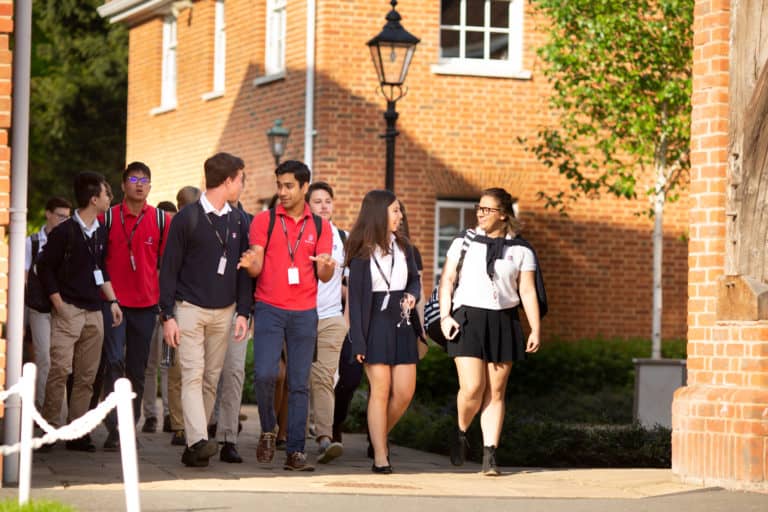
Tell us about the main principles and philosophies promoted at TASIS England.
We’ve actually just created a new mission statement for our school. It is: “TASIS England nurtures intellectual curiosity and emboldens each learner to flourish as a principled, open-minded, and compassionate member of a global community.” This statement was developed with all the constituent groups of our community – students, parents, our faculty and staff and the school board of governors.
We’re trying to hone in on what really defines us. For us, it is about nurturing intellectual curiosity, what we provide in and beyond our classrooms concerning pathways and opportunities for learning. The other point is about encouraging each learner to flourish. Regarding flourishing, how do we allow people to grow and develop as individuals, but also as individuals who are part of a community? We’ve highlighted the community aspect, which is more about connections. We believe that our community is blessed with healthy and enduring relationships.
“The question becomes, how do we use those relationships and connections to make a difference not only to the growth and development of TASIS England, but to other international schools around us, or even our local or global community?”
As we look at those questions, we see in them the ability of students to be curious, their ability to flourish, and the ability to give back to the community. We define those things as multiple pathways to learning. If we do those things well, we should really have three outcomes.
1) Lifelong learning, by instilling the skills and attributes needed to be a lifelong learner. We’re all learning continually. Everybody in our community is learning – students, our faculty and staff, our parents, our Board of Governors, and even the Leadership Team.
2) Service leadership. We take pains to foster empathetic, compassionate, and principled leadership. It’s about taking responsibility for sustaining healthy relationships with our selves, our families, our communities, and our environment.
3) International mindedness. That one really challenges us to explore, communicate, and celebrate our diversity. Ideally, it should create a desire for us to serve, and get involved in communities and our workplaces. There, we can bring our skills and attributes to the fore, and support the development of the community we are in.
How do you encourage understanding and community between the different international cultures in the school?
We have 57 different nationalities represented at TASIS England, and over 30 different languages are spoken here. Developing international mindedness isn’t just about service to others or community, it’s also about challenging thoughts and ideas. In our classrooms, we will open debates to challenge stereotypes or previously held opinions. Teachers ask the children to step into the role of “the other” – to look at a local or global issue from a lens that they may not have looked at it from before. We have all sorts of clubs and societies that develop and grow our community. Pupils also have service opportunities helping the local community in Thorpe, and even going overseas to orphanages in Romania. The key to it all is giving our students and our teachers the opportunity to see things from a different perspective.
The Annual International Fair
We also have an annual international fair, where every nationality represents itself through its culture and food. It’s really wonderful to see how proud people are of their culture and the opportunities for interaction that it brings. While we’re celebrating foods and flags, which tend to be the identifiable features of a culture, what’s great is seeing the conversations that it promotes. Learning “Why is this important to you?” and “What is it about your culture?” really helps students see the uniqueness of each one. Just because we have 57 nationalities represented here is not what makes us internationally-minded. What makes us internationally-minded is our ability to really challenge each other to explore, communicate, and celebrate that diversity.
As I mentioned earlier, I had the experience of growing up in Northern Ireland and having had the perception of “the other” from an early age. It’s something I’ve noticed in all my travels. As a result, I’m committed to making a difference in the lives of students, and in the lives of people, I work with, listening to other people’s perspectives, trying to understand them, and knowing that their opinions can equally be as right as my own.
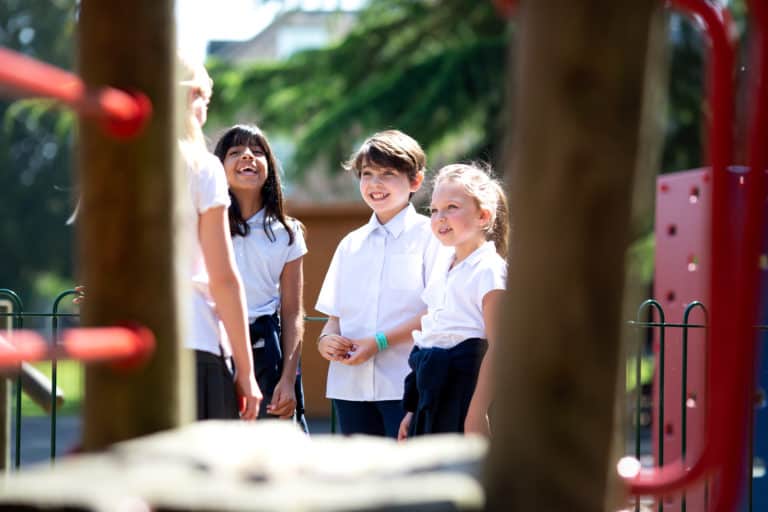
What would you say that are the features that parents value most about your school?
I can give you a pretty unique view of a parent at our school because I have three kids here. The school does a few key things we really like, and that other parents compliment us on. It goes back again to lifelong learning, service leadership, and international mindedness.
Many schools talk about individualisation or personalisation of learning, but TASIS England really does do it. Each teacher knows my children, the learning journey of each individual, and they promote lifelong learning in them. They celebrate their knowledge, challenge the learning that’s happening, and provide opportunities for further learning. They’re also supportive of them as individuals playing their role in the community, whether it’s through their classrooms, sports teams, activities, or the service programs.
Another thing we value is international mindedness. We make sure that the students are aware they’re in a multinational setting with many cultures. The students really gain a lot from that interaction with other kids who have entirely different perspectives. I think the other thing we provide that’s really great are the service opportunities to the community, classrooms, school, or even other countries. There are multiple opportunities and pathways for our kids to explore, on their journey to growing and flourishing.
What sort of extra-curricular activities are offered at TASIS England?
We offer a whole smorgasbord of sports during three different seasons. There’s tennis, basketball, volleyball, lacrosse, softball, baseball, soccer, and rugby. Those sports compete both locally and throughout Europe, and through organisations we belong to.
We also have lots of opportunities for learning extension and other activities such as entrepreneurial groups, subject-related groups, coding, robotics, and other groups. All those sorts of activities are there for extending your learning beyond the classroom.
We have a thriving visual and performing arts program. There’s a large theatre department that runs multiple productions throughout the year for the children to take part in. Our art program is extensive and offers multiple ways for exploration and expression through the visual arts. We also have an active music scene, where students can extend their learning beyond the music classroom into jazz bands, rock bands, orchestras or choirs.
Something that we’re looking into for the future is the development of a wellness centre. This would be a space where children can take time for themselves or take time to reflect. One thing we know is that you don’t really learn from experience, you learn from reflecting on the experiences that you’ve had. We think this kind of wellness centre would be a valuable addition for the students at TASIS England.
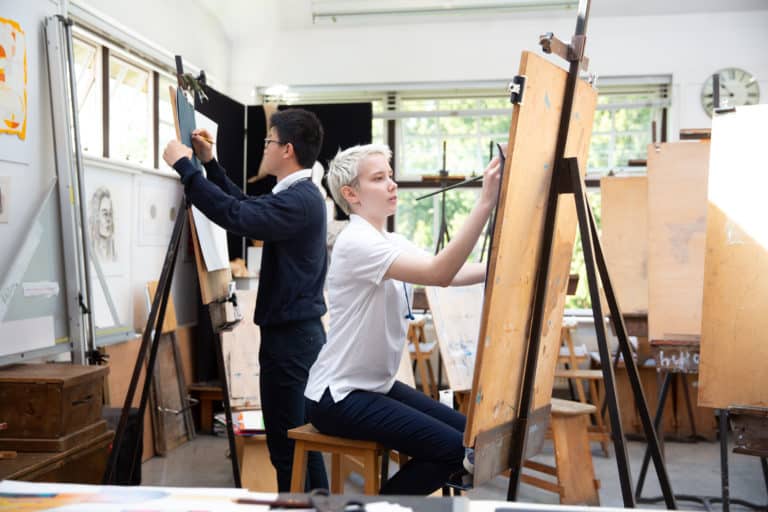
How does the school take advantage of what London has to offer, and the school’s location in the countryside?
TASIS England is ideally located just outside London, only 15 minutes from Heathrow and 45 minutes by train from the city. You can have all of the beautiful things that the city has to offer, but then still be in the suburban countryside, experiencing the relaxation and joy that it brings.
We have multiple educational field trips to various sites in London, including art galleries and museums. There are also trips to see musicals and even sports like rugby. For our boarding students, we provide lots of activities in the evenings and on the weekends.
Locally, we have a community tea, where we bring in the elderly in the community, and our students get to know them. It’s an excellent way for them to learn more about the village of Thorpe and its population. The older people in the village get to learn about our students and about the school. One of the local ladies is a bit of a historian. Each time we have an event, she tells the students more about the history of Thorpe.
Being so close to Heathrow, we have multiple opportunities to travel. In October, the entire Upper School goes to over 10 locations in Europe, each one linked to their learning. Whether it’s Greece, Italy, or France, wherever they’re going is connected to what they’re learning in their classroom.
Can you tell us about the school’s boarding program?
We have about 170 students from all over the world who board with us at TASIS England. Our goal is to give them a home away from home. As boarding students, we want to support them in gaining independence, taking on more responsibility, and developing resilience. The relationships that our boarding students build together are incredibly strong. They develop shared experiences and a deeper level of communication through the shared understanding of each other’s cultures. It’s lovely to see them build enduring, lifelong friendships.
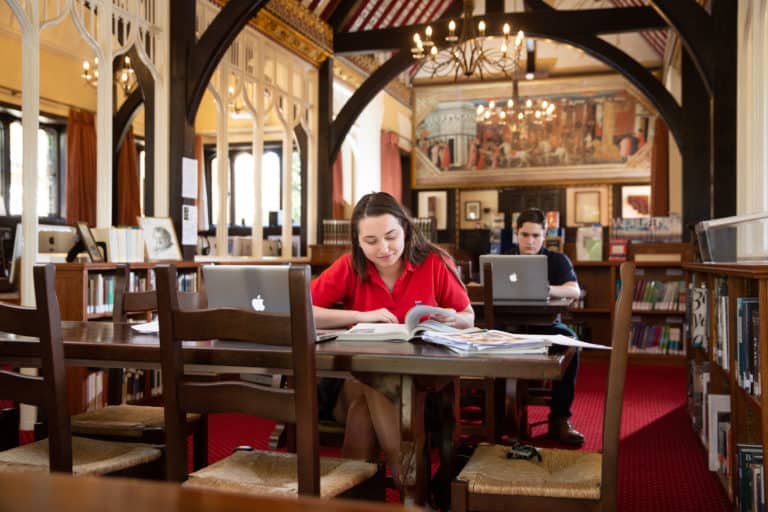
How do you help new students and their families settle in?
One thing that we have for all students and families are parent organisations. There are two – we have the TPA, TASIS Engand Parent’s Association; and another called PIRC, which is the Parents’ Information and Resource Committee. They’re two key bodies that assist our admissions team in making sure we transition families properly. PIRC works with the admissions team to pair families up – so we have buddy families and buddy students, who look after the new students. The buddies support them in their transition, providing valuable resources and information. This might include, for example, finding housing, or things to know about England. They also hold workshops and seminars for new families on transitioning to England and TASIS England, and also for transitioning back to your home country. It’s a huge commitment, but our school parents do this voluntarily and support each other.
We don’t see the transition as a one-stop shop. We see it as extending that service, that community, and that relationship well into their journey here at TASIS England. Change for some people can happen very quickly, but for other people, it takes a more extended period of time. We are available to them all the way through, for whatever is needed.
My kids came here in July. They were very quickly integrated by the students and by the teachers into the community. My kids would say it’s an incredible community concerning developing relationships. That sense of community and that sense of relationships is another crucial feature in helping people settle into TASIS England.
What are some of the main trends in education that you’re seeing at the moment? And the main challenges for education in the future?
The primary challenge is, what our students need for the future may be different from how we first thought about setting up schools and learning.
For example, if I look at what students are going to need in the future, knowledge is essential. But, what’s equally important is how they access it, how they review it, how they analyse and synthesize it, and how they make opinions and judgements about it. With the whole advent of fake news, this has become very important.
We’re also going to have to help our kids become much more flexible and adaptable. We’re going to have to provide them with a lot more creativity. Going forward, the ability to think in different ways will be necessary. Children today are going to have between 5 to 15 different careers in the future, and we need to make sure they are prepared. It’s about developing attributes and skills that are going to help them prepare for the future.
They’ll need to be open-minded, risk-takers, principled, and reflective; but also they will require highly developed skills in thinking, research, communication, self-management, and socializing. To help them improve all those things is a massive challenge for us. The world is changing so fast, but education is not really keeping up with the changes. Students will need the skills and attributes that will help them cope with the changes they will encounter.
I think education still needs to be idealistic. I do hope that the children who my colleagues and I have the pleasure to work with actually do go out and make a difference and make this world a better place for us all.
About TASIS – The American International School in England
TASIS England (The American International School) is a leading independent, co-educational school near London for day (ages 3-18) and boarding pupils (ages 14-18). Students from more than 50 countries contribute to a unique and dynamic learning environment. They thrive in an atmosphere that encourages character development and academic achievement and celebrates the school’s international population. To learn more, visit: www.tasisengland.org
More from International School Parent
Find more articles like this here: www.internationalschoolparent.com/articles/
Want to write for us? If so, you can submit an article for consideration here: www.internationalschoolparent.submittable.com
